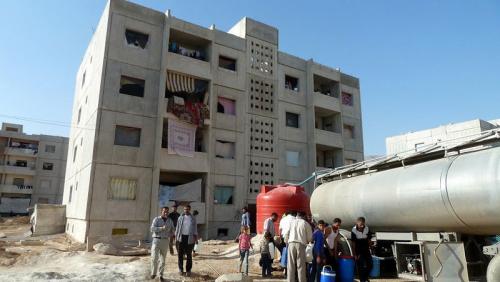Disruption of sanitation services in Syria putting children’s health at risk – UNICEF
The severe disruption of water and sanitation services and a lack of access to basic hygiene in Syria have increased the risk of water-borne diseases among children, the United Nations Children’s Fund (UNICEF) today warned, following a nationwide assessment.

Tanker trucks supply water to a housing complex in Adra, an industrial area northeast of Damascus, Syria.
The agency found that in areas affected by the conflict, water supplies are only available at one-third of pre-crisis levels, with many people having only 25 litres of water a day, compared with 75 litres when the conflict began two years ago.
“These results underline why UNICEF has prioritized assistance to the water and sanitation sector,” said the UNICEF Representative in Syria, Youssouf Abdel-Jelil. “This month we began an operation to ship 1 million litres of chlorine to provide safe water for more than 10 million people, or nearly half the national population, for three months.”
The assessment, carried out in cooperation with municipal water departments and local private contractors, identifies six areas where people’s ability to access safe water has been most severely restricted: rural Damascus, Idlib, Der Ez-Zor, Homs, Aleppo and al-Raqqa.
More than 60,000 people, mostly civilians, have been killed since the uprising against President Bashar al-Assad began in early 2011. Recent months have witnessed an escalation in the conflict, which has also left more than four million people in need of humanitarian assistance. UNICEF estimates that out of the four million people in need, 50 per cent are children.
Due to the conflict, national production of water treatment chemicals has almost ceased, increasing the risk of tap water being contaminated. Power cuts, fuel shortages and damage to infrastructure have also contributed to worsening water shortages.
UNICEF stated that families are increasingly relying on buying water supplied by mobile tankers, which can be very expensive. A family of seven, for example, must spend at least $15 every 15 days on water, which is more than many people can afford.
The assessment also found that in affected towns the treatment of sewage water has decreased by half – from 70 per cent before the crisis to 35 per cent now. In particular, UNICEF said people living in collective shelters are more vulnerable due to a lack of toilets, showers, hygiene items such as soap, and rationed access to water.
“We are doing everything possible to scale up our reach and ensure safe water and sanitation are available to more people,” said Mr. Abdel-Jelil, adding that the lack of funds is a major constraint.
So far, UNICEF has provided more than 22,000 emergency-affected people with drinking and domestic (for household use) water, and has distributed hygiene kits to some 225,000 people in conflict-affected areas.
The agency is appealing for $22.5 million as part of the Syria Humanitarian Assistance Response Plan launched in December to be able to provide safe drinking and domestic water, soap and hygiene kits, as well as toilets and bathrooms to 750,000 people through June.
UNICEF also plans to give 50,000 children water and sanitation facilities at schools and in child-friendly and temporary learning spaces, and to repair and rehabilitate community-based water systems.
The international community has committed more than $1.5 billion for humanitarian aid to Syrians. Supporting reconstruction of critical infrastructure, such as water pumping stations, and providing essential relief supplies like medicines are among the top four priorities inside the country, along with helping people who have fled their homes and the communities hosting them and helping the poorest avoid total destitution.
Meanwhile, the UN Relief and Works Agency for Palestine Refugees in the Near East (UNRWA) today warned that a grave humanitarian crisis has emerged in the Rid Damascus governorate where several Palestine refugee camps are situated.
The deteriorating security conditions surrounding the camps have severely limited access to services and have restricted movement, making it difficult for UNRWA to reach those who need assistance.
“UNRWA deplores the suffering inflicted on civilians in Syria and calls on all sides to do everything possible to ease it, including refraining from conducting the conflict in residential areas,” the agency said in a news release. “All sides must conduct themselves in ways that safeguard human life, protect civilians, ensure safe and free movement for civilians and allow unimpeded access to UNRWA and other humanitarian agencies.”
UN agencies are working both inside Syria and in neighbouring countries, where hundreds of thousands have fled. This week, the World Food Programme (WFP) started to distribute monthly food vouchers in Egypt to allow Syrian refugees to purchase essential items such as fruits, vegetables and dairy products. The voucher is aimed to provide the daily nutritional requirements of 2,100 kilocalories. WFP said it is aiming to reach 30,000 beneficiaries by June.
Source: UN News
- 431 reads
Human Rights
Ringing FOWPAL’s Peace Bell for the World:Nobel Peace Prize Laureates’ Visions and Actions

Protecting the World’s Cultural Diversity for a Sustainable Future

The Peace Bell Resonates at the 27th Eurasian Economic Summit

Declaration of World Day of the Power of Hope Endorsed by People in 158 Nations

Puppet Show I International Friendship Day 2020

